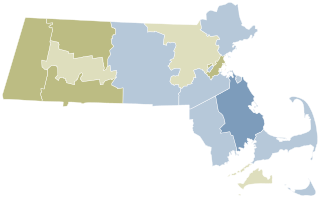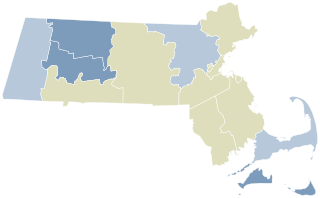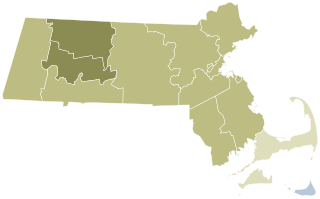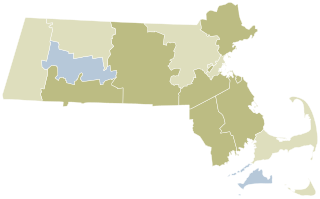Carla Howell is an American politician, small government advocate and activist. She was the Libertarian Party of Massachusetts candidate for Massachusetts State Auditor in 1998, U.S. Senate in 2000, and Governor in 2002. She then served in multiple leadership positions in the U.S. Libertarian Party. She has also organized tax-cut initiative ballot measures in Massachusetts and worked for the Libertarian National Committee.
In the politics of the United States, the process of initiatives and referendums allow citizens of many U.S. states to place legislation on the ballot for a referendum or popular vote, either enacting new legislation, or voting down existing legislation. Citizens, or an organization, might start an initiative to gather a predetermined number of signatures to qualify the measure for the ballot. The measure is placed on the ballot for the referendum, or actual vote.

The State Income Tax Repeal, also known as Massachusetts Question 1, was one of the 2008 ballot measures that appeared on the November 4, 2008 ballot in the U.S. state of Massachusetts. Voters were asked whether or not they approved of the proposed measure which, if it had passed, would have ended the 5.3% income tax in Massachusetts on wages, interest, dividends and capital gains. Ultimately, Massachusetts voters defeated Question 1 by a wide margin, with approximately 70% opposed versus 30% in favor.

The No Sales Tax for Alcohol Question, also known as Question 1, was on the November 2, 2010 ballot in Massachusetts. The measure asked voters whether to repeal a sales tax on alcohol sales. The ballot measure for the 2010 ballot was added after the Massachusetts State Legislature increased the sales tax in the state from 5% to 6.25% and eliminated an exemption for alcohol sold in liquor stores.

The Massachusetts Comprehensive Permits and Regional Planning Initiative, also known as Question 2, appeared on the November 2, 2010 ballot in the state of Massachusetts as an initiative. Question 2 was rejected by the Massachusetts voters by 1,254,759 "No" votes to 900,405 "Yes" votes. The measure had been sponsored by Better Not Bigger, a local advocacy group in the state.

Massachusetts Question 3, filed under the name, the 3 percent Sales Tax Relief Act, appears on the November 2, 2010 ballot in the state of Massachusetts as an initiative. The measure, if enacted by voters, would reduce the state sales tax rate from 6.25 to 3 percent. The measure was sponsored by the Alliance to Roll Back Taxes headed by Carla Howell. The measure would be enacted into a law 30 days after the election if approved by voters.

The Massachusetts "Right to Repair" Initiative (2012), also known as Question 1, appeared on the Massachusetts 2012 general election ballot as an initiated state statute. The Right to Repair proposal was to require vehicle owners and independent repair facilities in Massachusetts to have access to the same vehicle diagnostic and repair information made available to the manufacturers' Massachusetts dealers and authorized repair facilities. The initiative passed with overwhelming voter support on November 6, 2012, with 86% for and 14% against. The measure, originally filed four times with the Massachusetts Attorney General, was filed by Arthur W. Kinsman, and was assigned initiative numbers 11–17.

The Massachusetts "Death with Dignity" Initiative, also known as Question 2, appeared on the November 6, 2012 general election ballot in the state of Massachusetts as an indirect initiated state statute to allow physician-assisted suicide. The measure was filed with the Massachusetts Attorney General and would establish, according to those who filed the measure, an "Act Relative to Death with Dignity". The petition number for the initiative was 11-12, and was filed by Michael Clarke as "An Initiative Petition for an Act Relative to Death with Dignity".

The Massachusetts Medical Marijuana Initiative, appeared as the third question on the state's 2012 ballot as an indirect initiated state statute. The measure allows cannabis to be used for medical purposes in the state. The initiative—backed by the American Civil Liberties Union, the Massachusetts Patient Advocacy Alliance, and the Committee for Compassionate Medicine—was filed with proponents turning in the required signatures to the Massachusetts Attorney General's office by the August 3, 2011 deadline. Those signatures were needed for the required ten qualified voters who submitted the original petition to put forward the full text of the law they want enacted. The initiative passed with support from 63% of state voters.

Cannabis in Massachusetts is legal for medical and recreational use. It also relates to the legal and cultural events surrounding the use of cannabis. A century after becoming the first U.S. state to criminalize recreational cannabis, Massachusetts voters elected to legalize it in 2016.

The Massachusetts Automatic Gas Tax Increase Repeal Initiative, Question 1 was on the November 4, 2014 statewide ballot. Approved by voters, the measure repeals a 2013 law that would automatically adjust gas taxes according to inflation, allowing for automatic annual increases in the state's gas tax.

An Act to Prevent Cruelty to Farm Animals, more commonly known as Question 3, was the third initiative on the 2016 Massachusetts ballot. The measure requires Massachusetts farmers to give chickens, pigs, and calves enough room to turn around, stand up, lie down, and fully extend their limbs. It also prohibits the sale of eggs or meat from animals raised in conditions that did not meet these standards.

The Massachusetts Legalization, Regulation and Taxation of Marijuana Initiative also known as Question 4, was an indirect initiated state statute question to legalize, regulate and tax recreational marijuana that appeared on the November 8, 2016 Massachusetts general election ballot.

The Massachusetts Charter School Expansion Initiative, Question 2 was an unsuccessful initiative voted on in the Massachusetts general election held on November 8, 2016. It was one of four 2016 ballot measures put to public vote.

The Massachusetts Casino Repeal Initiative was an unsuccessful initiative voted on in the Massachusetts general election held on November 4, 2014. It was one of four 2014 ballot measures put to public vote.

The Massachusetts Paid Sick Days Initiative was a successful initiative voted on in the Massachusetts general election held on November 4, 2014. It was one of four 2014 ballot measures put to public vote.
Three ballot measures were certified for the November 6, 2018, general election in the state of Massachusetts.
The 2020 Massachusetts general election was held on November 3, 2020, throughout Massachusetts. Primary elections were held on September 1, 2020.

Massachusetts Ranked-Choice Voting Initiative, also known as Question 2, was an initiative at the 2020 Massachusetts general election that would have changed primaries and elections in Massachusetts from plurality voting to ranked-choice voting (RCV) for all Massachusetts statewide offices, state legislative offices, federal congressional offices, and certain other offices beginning in 2022. RCV would not be extended to elections for president, county commissioner, or regional district school committee member. The initiative failed, with 54.8% of voters voting 'No' and 45.2% 'Yes'.

The Massachusetts Right to Repair Initiative (2020), also known as Question 1, appeared on the Massachusetts 2020 general election ballot as an initiated state statute. It was approved by voters and the measure will update the state's right to repair laws to include electronic vehicle data. A similar Right to repair initiative appeared on the 2012 state ballot and passed with 86% of the vote.



















